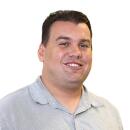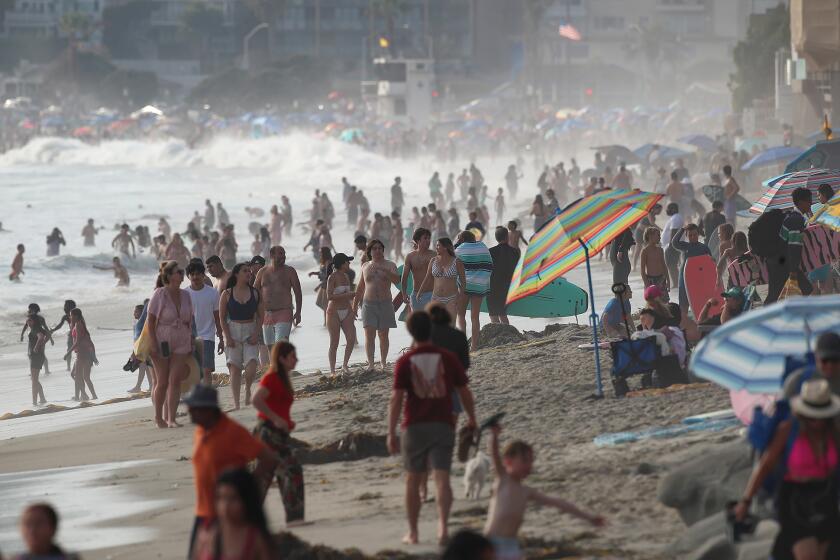Huntington Beach man meets heart valve engineers who saved his life

- Share via
Ben McCullough was given a gift early in his tour of the Edwards Lifesciences headquarters on Wednesday morning.
The lapel pin meant a lot to McCullough, as it represented the 56-millimeter EVOQUE valve that an Edwards team stitched together to put in his heart.
McCullough, a 76-year-old United States Navy veteran who lives in Huntington Beach, accepted it with pride.
“I was in the Navy for 24 years, and I had a lot of stuff hanging on my uniform,” he said. “This is the most important.”

McCullough and his wife, Laurie, herself a U.S. Army veteran, took the tour of the Edwards campus in Irvine. Later, they participated in a question-and-answer session for dozens of Edwards employees before doing a demonstration with the research and development team.
All of those things were scheduled.
What Ben McCullough didn’t know was that the two doctors who performed his heart surgery last November at Providence St. Joseph Hospital of Orange, Brian Kolski and Jeffrey Tyler of the Orange County Heart Institute, would also be there.
He called it a wonderful surprise.
“It completes the journey for me, getting here,” he said. “These folks all made it possible. They all collaborated at the same time to make it possible for me.”

McCullough said he’d been having heart issues for more than a decade. A few years ago, he was diagnosed with tricuspid regurgitation. One of his heart valves didn’t close tightly enough, allowing blood to flow backward instead of in one direction.
Edwards’ EVOQUE transcatheter tricuspid valve replacement system was the first transcatheter therapy to earn U.S. Food and Drug Administration approval in February 2024. However, only three smaller-sized valves — 44, 48 and 52 millimeters — were approved at that time.
For Ben, who liked to live an active lifestyle including running and surfing, this was a race against time. The larger-size device wasn’t approved until near the end of October.
“I tried to instill the fact that we’re doing everything, and hopefully be patient, because we might be able to get this fixed down the road,” Kolski said. “I think he was patient. As I saw him declining, and the therapy was FDA-approved, he was obviously the first person I thought of. I’d known him for a long time.”

Laurie told the Edwards staff that things had gotten bleak enough to get the family all together for what could be one final time.
“It’s tough watching your husband slowly die,” Laurie McCullough said. “It’s tough when this vital man who ran the Boston Marathon can’t walk from one side of the room to the other. It’s really tough when he can’t do anything around the house anymore, and it’s exhausting taking care of somebody. There would be times I would find this place outside and just sort of cry.”
Ben’s minimally invasive surgery was scheduled for Nov. 18, 2024. He said that he had to get his leg to settle down for about five hours immediately afterward due to the catheter that was installed, but he otherwise immediately felt better.
“I was still groggy from the anesthesia, but my breathing, I just felt better,” he said. “Dr. Kolski came in the next day and did a scan of me, and he said my overall heart function had already improved.
“I had a pass on doing chores at home, so I didn’t stress my leg. I milked that as long as I could.”

During Wednesday’s tour at Edwards, McCullough got to meet the heart valve specialists who actually sewed his EVOQUE valve together. It took a team of 25 people about 20 hours to complete the valve, made of bovine pericardial tissue.
Jennifer Lancaster is director of clinical program management in transcatheter mitral tricuspid therapy (TMTT) at Edwards. Her team did the clinical study that was approved last year.
Lancaster served as moderator for the McCulloughs’ panel discussion.
“It’s incredibly powerful for our team to see the human impact of our work, particularly within our own community,” she said. “There are many people out there who have potentially been impacted by our work, and we may pass them in the grocery store and not even know that they’ve been impacted by our work. But to have Ben here with Laurie, to share their personal story and their experience of how their lives have been changed by something our team did, it makes it easier for us to persist in the face of challenges and to continue the work that we do.”

Laurie McCullough said the gratitude goes both ways. After Christmas, the whole family went on an extended trip to Baja California.
“This was a new man,” Laurie McCullough said of the rejuvenated Ben. “This man had color in his face where he was ashen before. This is a man who now had an appetite, where he could barely eat before. He was a joy to be around now. I’ll tell you, he wasn’t such a joy before.”
Husband and wife look forward to traveling more this spring, as well as going to Angels baseball games.
It’s a big change from the way things were before the procedure, when she had to do things like get smaller bath towels for her husband because it took too much energy for him to use a bigger one.
“He didn’t even know I was doing that, but life is just back to normal stuff now,” Laurie McCullough told the Edwards employees. “That’s huge. You don’t have to do big stuff. It’s just little living things that make a difference. That’s what you guys gave us. That is really special.”
All the latest on Orange County from Orange County.
Get our free TimesOC newsletter.
You may occasionally receive promotional content from the Daily Pilot.




